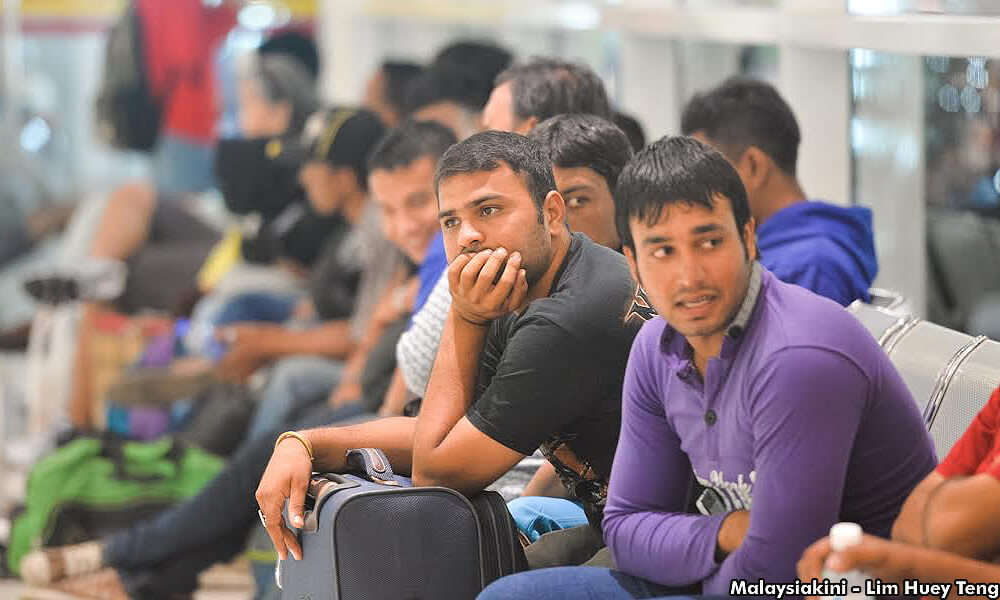
As our public debt soars whilst the Ringgit falls, the Federal Government once again proves its incompetence in managing our public coffers. The Federal Government’s haphazard treatment of instrumental policies is a manifestation of ineptitude as they stumble through efforts to reduce our deficits from decades of fiscal mismanagement, waste and corruption.
Take for example the presence of foreign workers, a subject which remains contentious in Malaysia. Understandably, it only makes financial sense for businesses to open their arms to an influx of low-cost foreign workers. But simultaneously, many of us complain of the depressed national wage levels as a result of cheap foreign labour, the lamentable socio-economic conditions of the migrant community, and sometimes, the overcrowding effects in particular pressures on public services and facilities.
A balance must be achieved — that foreign workers enter our economy at a moderate pace and be able to live decently, while businesses, in their pursuit of profit and capital optimisation, to also invest in up-skilling local workers and in technology in order to sustain high productivity for a stronger economy.
Yet, our Federal Government continues to shy away from tackling Malaysia’s long-standing over-reliance on foreign workers. Under Najib’s government, the 11th Malaysia Plan’s goals to “accelerate human capital development for an advanced nation” seem at best, unachievable.
The Najib government’s continuous set of fallacies
On the last day of 2016, Deputy Prime Minister Datuk Seri Zahid Hamidi announced that all employers will pay the levy for hiring foreign workers beginning in 2017, as opposed to deducting the sum from the workers’ wages[1]. Barely two weeks later, the mandatory imposition of foreign workers’ levy payment on employers was rescinded, postponed to 2018 upon pressure from employers.[2]
Coincidentally, in January 2017, the BN government also walked out of another policy when it revoked the JPA overseas scholarship that was awarded to 744 stellar students. Back then, the Federal Government claimed that the reallocation of these students to local universities would boost the quality of local institutions.
Unfortunately, with Najib Razak continuously slashing the budget of our higher education institutions year after year, everything that Najib mouthes seems nothing more than a mere fallacy.
Clearly, our Federal Government under Najib Razak is inept in making good on any of its policies, such is the hasty back and forth of the foreign worker levy policy.
Maintaining a Reasonable Foreign Worker Population
It is most likely that the government chose to postpone its policy due to pressure from employers. Understandably, the main gripe that employers have against bearing the levy burden is that they will soon incur more cost upfront.
But this reluctance by employers is precisely the intended effect of the levy policy — that it serves as a deterrent against the addiction to hiring foreign workers.
Employers of labour-intensive industries are especially worried, but a higher manpower cost can serve as an impetus to modernise and mechanise the sector with substantial gains in productivity and output as a result. For example, the construction sector’s over-reliance on physical labour is traditionally associated with low productivity.
Despite employing 9.3% of the workforce, the construction sector only makes up 4.4% of the GDP.
The 2016 Malaysia Productivity Report recommends that the construction sector be “more aggressive in adopting modern technologies and practices to reduce its over-dependence on low-skilled labour.”[3] This transition can then reduce cost in construction methods and a safer working environment in addition to better wages for workers.
Thus, for Malaysia’s economy to move up the value chain, it is now necessary to manage our foreign worker population in Malaysia. Even the 11th Malaysia Plan too acknowledged the pertinence of a manageable foreign worker population, iterating that “The proportion of foreign workers in the workforce is capped at 15% of total workforce in 2020.”[4]
Currently, we have 4 to 7 million foreign workers in Malaysia who occupy about 25-30% of our workforce. Conversely, the overdependence on low-cost but low-skilled labour may have shut the door to 200,000 unemployed graduates, unable to leverage on their skills for our economy. Why then should the Federal Government make a U-turn on its stance?
This is reminiscent of continual, excessive budget cuts in our country’s public universities. This year, our 20 public universities are expected to run its daily operations with a total of RM6.12 billion of federal funding, that is a 19.23% cut from the RM7.57 billion allocation in 2016,[5] or a 30% markdown from the RM8.75 billion allocation in 2015.[6][7] In addressing this, Higher Education Minister Datuk Seri Idris Jusoh simply stated the imperativeness for local public universities to look for other sources of funding. The shock to our universities would have been less drastic had the government reduced funds gradually while establishing self-sustaining endowment and/or waqf funds. It is estimated that by the end of 2016, seven of our public universities collected RM13.25 million in waqf endowments. But the same seven universities are suffering a net loss of RM95.39 million in budget cuts this year, if compared to 2016. No doubt, Waqf and endowment funds are critical pieces of long-term university funding but their significance and expansion will have to be in stages and managed in a careful and gradual manner for sustainable growth trends. The overnight conversion from federal funding to endowment route is haphazard and reeks of BN’s desperation caused by a failure in governance.
That the Malaysian government opted out of their own policy shows cowardice and rash policy-making.
Moving forward with clarity
Datuk Seri Liow Tiong Lai had said that a postponement was “necessary in the absence of a proper ecosystem under the newly introduced Employer Mandatory Commitment (EMC) to resolve issues involving foreign workers.”[8]
Regardless of whether this ecosystem is present, it will never assuage the employers’ perennial grouses of cost increases as long as the burden of paying the levy is transferred to them.
What the BN government should have done instead was to implement an adequate transition plan that would allow employers to adapt to a new policy, without excessive financial strain.
The implosion of the 1MDB scandal has cost us financially as the Ringgit continues to depreciate, our public debt continues to climb, and investor confidence in Malaysia wanes. Yet, the BN government is incapable of implementing bold reform measures, pandering time and again to insatiable demands of an overprivileged and sycophantic elite. Our overdependence on foreign workers is actually unhealthy to both foreign and domestic workers, and eventually to our economy as a whole. This flawed policy is coupled with the thoughtless neglect of the nation’s best brains.
A country with tremendous potential such as ours requires leaders who are willing to prioritise the nation, over their narcissistic selves. We urgently need clear-cut, smart and equitable policies – as we traverse the future to build a path to high-wage, high-productivity and sustainable economic growth.
________________
[1] http://www.themalaymailonline.com/malaysia/article/bosses-to-pay-foreign-workers-levy-from-own-pockets-starting-jan-1
[2] http://www.scmp.com/news/asia/southeast-asia/article/2061521/malaysia-deferrs-foreign-workers-levy-payment-2018
[3] http://www.mpc.gov.my/wp-content/uploads/2016/06/Productivity-Report-2016.pdf
[4] http://rmk11.epu.gov.my/book/eng/Elevent-Malaysia-Plan/RMKe-11%20Book.pdf
[5] http://www.themalaymailonline.com/malaysia/article/budget-2017-public-universities-suffer-almost-20pc-spending-cut
[6] http://www.zairil.com/with-budget-cuts-of-up-to-27-how-will-our-universities-become-world-class/
[7] http://www.treasury.gov.my/pdf/bajet/maklumat_bajet_kerajaan/2016/b64.pdf
[8] http://www.scmp.com/news/asia/southeast-asia/article/2061521/malaysia-deferrs-foreign-workers-levy-payment-2018



